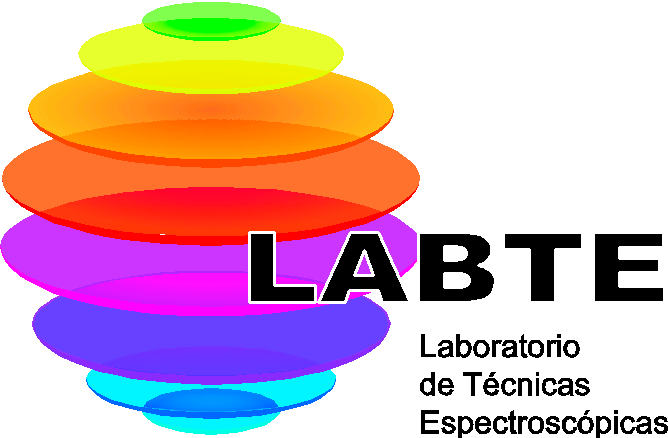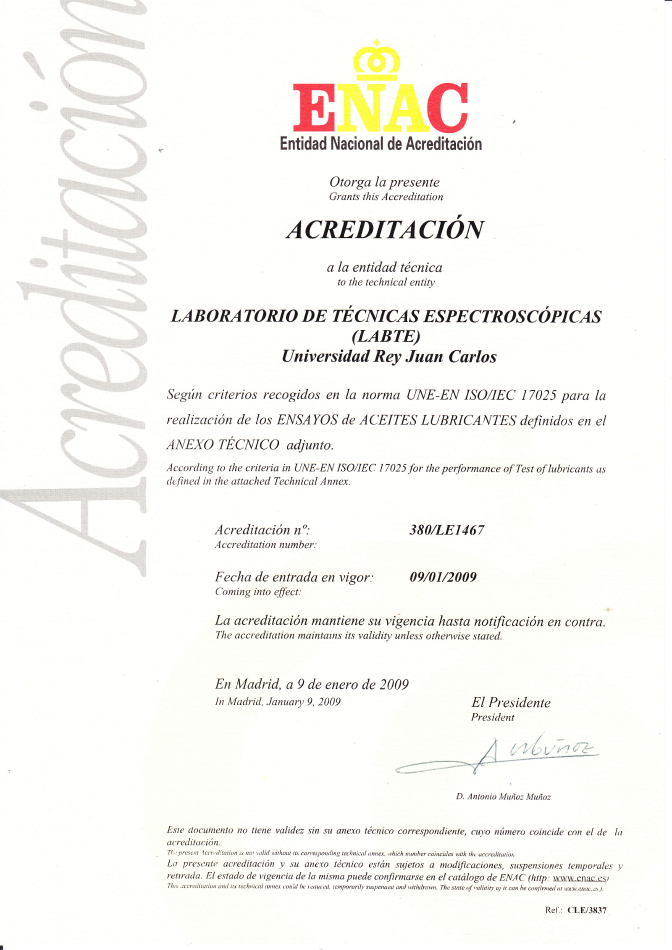|
Responsible: Jose Iglesias Moran Address: c/ Tulipán s/n. Mostoles 28933 Department: Chemical and Environmental Technology Phone: 91 488 85 65. Web: http://www.labte.es |
 |
Essays/Services offered
The Laboratory of Spectroscopic Techniques (LABTE) was created with the aim of providing high-quality physicochemical analysis results to its clients, which include companies and public-private organizations, in addition to the different research groups of the Rey Juan University. Carlos, and from other universities, which use the LabTE test techniques. In this sense, our laboratory has the desire to have the most advanced technology possible to respond to the analytical requirements of our customers.
The LABTE integrates seven different areas of work for physicochemical analysis of samples: inductively coupled plasma atomic emission spectroscopy (ICP-OES), spectroscopic techniques (FT-IR, DR UV-Vis, RAMAN), mass spectrometry (GC- MS), elemental and microelemental analysis, particle size analysis, thermogravimetry and surface analysis of porous materials through chemisorption and physisorption. In these areas, the following analytical tests/services are offered:
1- Inductively coupled plasma atomic emission spectroscopy (ICP-OES)
The tests carried out consist of the determination of metals in different samples:
- Aqueous Solutions
- FCC catalysts
- Hydrocarbon Cuts
- Gasoline
- Polyols
- Polymers
- rubbers
2- Fourier transform infrared spectroscopy, RAMAN and UV-Vis
The tests carried out are:
- Polymer identification
- Measurement of hydrocarbon levels in waters
- Catalyst characterization
3- Gas Chromatography – Mass Spectrometry
The tests carried out are:
- Separation and identification of volatile and semivolatile mixtures
4- Elemental analysis C, H, N, O, S and microelemental analysis Cl, S, N.
The tests carried out are:
- Determination of percentage concentrations of CHNS and O
- Determination of concentration at ppm level of halogens, sulfur and nitrogen
5- Particle size distribution analysis by laser radiation dispersion
The tests carried out are:
- Zeta potential measurement
- Particle size and distribution measurement
- Number of samples analyzed in 2023: 232
6- Thermogravimetry analysis
The tests carried out are:
- Sample Weight Loss Evaluation
- Obtaining TGA curve
7- Surface analysis by chemisorption and programmed temperature
The tests carried out are:
- Reaction tests at programmed temperature (TPO / TPR)
- Measurement of surface area, pore volume and size distribution in materials.
- Measurement of active surface area in catalysts
Our Team
|
Jose Iglesias Moran Laboratory Director University Professor / Director of the Department of Chemical, Energy and Mechanical Technology 34-914888565-XNUMX |
Director and Scientific Manager of the Laboratory. Professor at the University of Chemical Engineering and Director of the Department of Chemical, Energy and Mechanical Technology at the Rey Juan Carlos University. Chemical Engineer from the Complutense University of Madrid (1999) and Doctor of Chemical Engineering from the Rey Juan Carlos University (2005). He is a visiting researcher at the University of Cambridge (2003), at the University of Glasgow (2006) and at the Institute for Research on Catalysis and the Environment – IRCELYON (2017). His research focuses on the rational design of heterogeneous catalytic systems with applications in fine chemistry, petrochemistry, environmental chemistry and chemical and energy recovery of biomass. |
|
Amaya Arencibia Villagra ICP-OES Technical Manager Profesora Titular de Universidad 34-914887085-XNUMX |
Laboratory Technical Manager. Full Professor at the University of Chemistry-Physics. She graduated in Chemical Sciences from the Complutense University of Madrid (2000) and has a PhD in Chemical and Environmental Technology from the Rey Juan Carlos University (2006). She has spent stays in the Department of Chemistry at Michigan State University. Her research focuses on the development of materials for effluent decontamination through adsorption, molecular capture and photocatalysis processes. |
|
Victoria Morales Perez Quality manager Profesora Titular de Universidad 34-914888090-XNUMX |
Laboratory Quality Manager. Full Professor at the University of Chemical Engineering. Chemical Engineer from the University of Castilla La Mancha (2001) and Doctor from the Rey Juan Carlos University (2008). Visiting researcher at the Ecole Nationale Supérieure de Chimie de Montpellier (2006) and the University of California at Santa Barbara (2009, 2013). His research focuses on the synthesis of catalysts with applications of interest in the fine chemistry sector and the study of transformation processes of biomass and byproducts of oleaginous microorganisms applicable in a biorefinery. |
|
Belen Retuerto Sandin Senior Technician / PAS 34-914887094-XNUMX
|
Senior Technician in Chemical Analysis and Control (Virgen de la Paloma Institute, 2001). Occupational Risk Prevention Technician (Madrid Training Institute, 2004). Senior Technician of the Laboratory of Spectroscopic Techniques (LABTE, 2004) He worked with high and low pressure reactors for polymerization projects, and currently works with oil and related products. In his work as a LABTE Technician, she is an expert in the different characterization techniques for various samples: catalysts and hydrocarbons (ICP-AES, GC-SDA, HPLC, FT-IR, CHNS-O, UV-VIS, TG, Physisorption , Microscopy, ...). He performs tasks within the framework of the Quality System according to criteria set forth in the UNE-EN ISO / IEC 17025 standard implemented in the laboratory. |
|
Juan Manuel Suarez Munoz Senior Technician / PAS 34-914887094-XNUMX
|
Graduated in Energy Engineering (Rey Juan Carlos University, 2017). Superior Technician in Environmental Chemistry (Virgen de la Paloma Institute, 2003, Madrid). Senior Technician of the Spectroscopic Techniques Laboratory (LABTE, 2006). Having participated in more than 15 research projects, he has acquired knowledge in the analysis of catalysts, polymeric materials, petroleum products, .... Among his functions, he performs analysis, management and control tasks in different techniques (ICP-OES, GC, FTIR, Physisorption, UV-VIS, HPLC, Microscopy, ...) He is a specialist in ICP-OES, having developed methods for analysis in different matrices. He performs tasks within the framework of the Quality System implemented in the laboratory under the UNE-EN ISO / IEC 17025 standard, as well as the management of the Lims of the laboratory. |
|
Cintia Segovia Gonzalez Junior Technician 34-914887627-XNUMX
|
Degree in environmental science. Junior Technician of the Laboratory of Spectroscopic Techniques (LABTE, 2021). Among its functions is the characterization of sludge from the refinery, monitoring and control of a biological membrane reactor for wastewater treatment, as well as Kjendahl nitrogen analysis, colorimetry, HPLC, TOC,... |
Available equipment
The technical equipment available in the Spectroscopic Techniques Laboratory of the Rey Juan Carlos University is the following:
1- Inductively coupled plasma atomic emission spectrometers (ICP-OES)
Agilent 5800 ICP-OES – 2 Units
Varian 720-ES ICP
Measurement range λ=167-758nm
Main accessories:
- 63-position automatic injector
- Ultrasonic nebulizer (U5000AT+)
- Isomist thermostatic misting chamber (-10ºC – 60ºC)
2- Fourier transform infrared spectrophotometer
FT-IR Perkin Elmer Spotlight 2000 - Frontier
Measurement range n=20000-50 cm-1
Main accessories:
- Climatic chamber and vacuum system for testing with molecular probes
- UMA 600 optical microscope for acquisition of spectral maps with a resolution of 20 µm.
3- RAMAN spectrophotometer
Horiba Jobin-Yvon HR 800 UV
Helium Laser - Neon λ=633nm and 532nm
Main accessories:
- Sample holders for solids and liquids
- Confocal microscope with three objectives (10x, 50x and 100x)
- Total area CCD detector 1024x256 p, -77 C, air cooled
- Motorized ND filter wheel
4- Ultraviolet Spectrophotometer - Visible - Near Infrared
Agilent Cary 5000 UV-VIS NIR Spectrometer
measurement range λ=200-2500nm
Main accessories:
- Climatic chamber and vacuum system for testing with molecular probes
- Integration sphere and prying mantis for testing with solid samples
5- Gas Chromatography – Mass Spectrometry
Agilent 8860 GC System 5977 B GC-MSD
Measurement range. Since m/z=44
Main accessories:
- Chemical and electronic impact ionization
- Quadrupole mass detector
- Wide variety of GC capillary columns.
6- Elemental analyzer C, H, N, O, S.
Thermo Fisher Flas Smart
Thermo Fisher Flash 2000
Measurement options: CHNS, CHN, CNS, CN, O
Main accessories:
- Metler Toledo XP6 balance with a resolution of 0.001 mg
7- Laser radiation dispersion particle size distribution analyzer
Particulate Systems Nano Plus
Measurement range: 0,6-10000nm
Main accessories:
- NanoPlus AT
8- Thermobalances for TGA / DTA / DSC analysis
Mettler Toledo TGA / DSC 1 Star System (2 units).
Sample capacity: Up to 0,35 g (Unit 1); Up to 5g (Unit 2).
Measurement range: 25 - 1100ºC (Unit 1); 25 – 1600ºC (Unit 2)
Controlled atmosphere 0 – 1000 mL·min-1
Main accessories:
- 34-position automatic samplers
9- Surface analysis by chemisorption and programmed temperature
Micromeritics AutoChem III
Measurement range: Ambient – 1200ºC
Main accessories:
- SAGI 200 mass spectrometer
10- Analysis of textural properties by manometric porosimetry of gas adsorption
Micromeritics TriStar II Plus (2 units)
Micromeritics 3Flex (2 Units)
Main accessories:
- Degassing by heating in nitrogen flow or vacuum
- Adsorbates: N2, Ar and CO2
- Analysis temperatures: 77K, 87K, 273K
- Assays: BET, t-plot, αs, βs, Dp (HK-SF, DR, DA, BJH-KJS, B.dB., DFT, NLDFT),
Access to the service
To access our LIMS tool, you must request and configure VPN access to the Rey Juan Carlos University network.
To manage your registration, please contact us by sending an email to or by filling out the contact form.
If you already have VPN access configured and active, you can access it from here: http://lims-labte.urjc.es:8000/Lab
Certification / Accreditation of the quality system
The management system of the Spectroscopic Techniques Laboratory has been developed particularly effectively for the ICP-AES, HPLC and GC-SDA areas, where LABTE has implemented a Quality Management System. This quality management system is based on the ISO/IEC 17025:2005 standard. Likewise, the analysis procedure that we follow for the analysis of the content of metals in lubricating oils (Standard ASTM-D-5185:13) has been accredited by the National Quality Accreditation Entity (ENAC) for some years now ( Accreditation number 380 LE 1467). Our management system and analysis procedure are periodically audited in order to maintain our activity within the high quality standards demanded by our clients.



